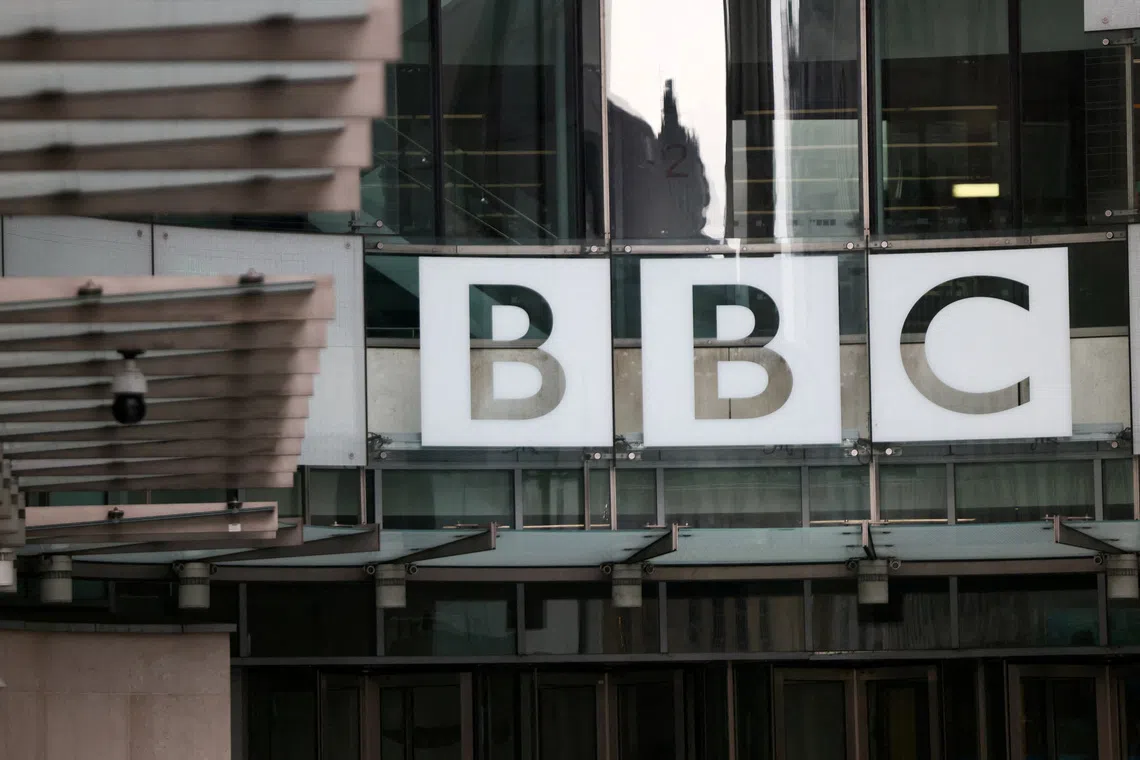Trump’s battle with the BBC could threaten its global reach
Sign up now: Get ST's newsletters delivered to your inbox

At risk is the credibility of an organisation that has long sought to be a standard-bearer for impartial journalism.
PHOTO: REUTERS
LONDON - When British broadcaster BBC launched an expansion into the US in June, its head of news promised “trust at a time of dramatic global uncertainty”.
Five months on, US President Donald Trump is threatening a US$5 billion (S$6.5 billion) lawsuit; governments long hostile to independent news are vowing to make life difficult for the British broadcaster; and its news chief Deborah Turness has left.
The crisis
While it has apologised and director-general Tim Davie and Ms Turness have quit, the failure hands ammunition to Mr Trump and his supporters who accuse mainstream outlets like the BBC of bias, sucking it into a broader battle over journalistic standards and freedom to report.
At risk is the credibility of an organisation that has long sought to be a standard-bearer for impartial journalism. The BBC broadcasts in 43 languages across 64 countries, reaching 418 million people every week, making it the biggest English-language digital news service in the world.
The World Service has been relied on in times of conflict, broadcasting to Nazi-occupied parts of Europe during World War II, behind the Iron Curtain in the Cold War. To this day, it is viewed as a vital resource in places such as African countries where democracy and freedom of speech are under threat.
Critics of BBC vow to become more aggressive
The organisation is facing a barrage of criticism.
The White House has called the BBC “100 per cent fake news” and a “propaganda machine”, terms that countries like Russia usually level at the 103-year-old broadcaster.
In India, where the BBC has clashed with Prime Minister Narendra Modi’s government, an official told Reuters they would cite the Panorama edit the next time they had a problem.
“If they say that ethics and morals guide them to report impartially, we would say that they first need to wash away this episode from their history books before brandishing their standards to us,” the official said, declining to be named.
One diplomat from a Group of 20 country that is normally hostile to the West told Reuters that it would now take a much tougher line with the BBC, saying that if an ally of Britain, like Mr Trump, could sue, then so could they.
Russia, which is ranked 171st out of 180 countries by Reporters Without Borders for press freedom, said the BBC was nothing but a propaganda and disinformation tool.
Former BBC staff, media analysts and a historian of the corporation say the broadcaster can survive this crisis, but it cannot be seen to buckle in the face of pressure from Mr Trump.
“If you look at the difficulties the BBC faces, its correspondents in Moscow, in China; if the BBC is seen to give in, then other bullies will emulate Donald Trump,” Mr Roger Bolton, a former BBC editor and presenter who now produces a podcast on it, told Reuters.
BBC chair Samir Shah has said it will fight any lawsuit, after US peers ABC News and the parent company of CBS settled lawsuits with Mr Trump by donating to his presidential library. Before settling, the networks called the accusations meritless.
A BBC spokesperson said BBC World Service played “an active role in countering disinformation and serving those in extreme need with critical information through our lifeline services”.
Widely respected but under financial, political pressure
Widely respected around the world, the BBC still tops polls in Britain as the most trusted news brand and, according to pollster YouGov, it came second in a 2025 poll of the most trusted news brands in the US, behind the Weather Channel.
But the corporation, which is largely funded by a licence fee paid by all television-watching households in Britain, comes under intense scrutiny from critics in Britain, who object to its funding model and perceived liberal stance. Current criticism has also alleged anti-Israel bias in its coverage of the war in Gaza.
The BBC says its income is down by £1 billion a year in real terms compared with 2010. Britain’s National Audit Office said in November that this had forced BBC World Service to cut staff, TV and radio stations, contributing to a 14 per cent drop in audience numbers since 2022/23.
In response, the BBC has tried to expand commercially, including in the US, where it says nearly 60 million people use BBC.com and where it launched a paywall earlier in 2025.
Ms Emily Bell, previously at the Guardian and now at Columbia Journalism School in New York, said there was huge demand in the US for impartial or non-aligned news.
But she said the BBC could struggle if Mr Trump pursues his case. His administration could apply pressure by limiting the BBC’s access to press briefings and subjecting it to closer regulatory scrutiny.
“The bigger question will be, how much pressure does Donald Trump want to apply?” Ms Bell said.
Officials can apply pressure in different ways
Last week, the US Federal Communications Commission wrote to the BBC about its “deceptive conduct”, and to US news outlets NPR and PBS to ask if they had aired the footage.
In India, the BBC has faced tax searches and a fine for alleged foreign exchange violations after it broadcast a documentary in 2023 about Prime Minister Modi’s role during deadly 2002 Hindu-Muslim riots.
Supporters say the government needs to defend the BBC, after British Prime Minister Keir Starmer urged it to get its house in order. They cite surveys that show people overseas consuming BBC output feel more positively towards Britain.
“One mistake is not what the whole of the BBC’s reputation is founded on,” said Ms Mary Hockaday, a former controller of BBC World Service English and master of Trinity Hall, Cambridge. REUTERS


